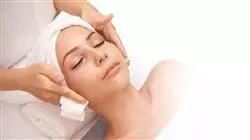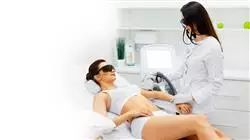University certificate
The world's largest faculty of nutrition”
Introduction to the Program
Thanks to this Masters Degree you will be able to offer your patients the best dermo-cosmetic treatments and nutritional advice"

There are a multitude of external factors that influence the appearance of the skin. Stress, environmental pollution and health conditions are just some of the factors that can lead to dry, unhealthy-looking skin. However, an internal factor that has a direct impact on the appearance of the skin is undoubtedly nutrition. Diets based on ultra-processed foods, excess salt or sugar and even uncontrolled eating can cause visible lesions or premature aging of the skin.
It is therefore crucial that nutrition professionals have a thorough understanding of how diet influences the condition of the skin and, above all, how, through diet, skin damage, lesions or pathologies can be reversed. This Masters Degree provides students with an understanding of the impact of nutrition on the skin, as well as the most appropriate medical-aesthetic treatments and approaches for each case.
Over the 1,500 hours of intensive education included in the program, students will explore everything related to Antiaging nutricosmetics as a means of improving and reversing the ravages of age on the skin. Likewise, they will also learn about the most common nutritional problems related to dermo-aesthetics, as well as the most common psychological disorders linked to food and the skin.
Thus, after passing the assessments for this Masters Degree, students will be able to offer a distinctive and innovative approach that will positively impact their patients. This will help them position themselves at the forefront of the profession.
With this Masters Degree, you will not only learn the about nutrition and its relationship with the skin, but also the most appropriate aesthetic treatments for each case”
This Masters Degree in Aesthetic Medicine for Nutritionists contains the most complete and up-to-date scientific program on the market. Its most notable features are:
- Case studies presented by experts in dermocosmetics and nutrition
- Graphic, schematic, and practical contents which provide scientific and practical information on the disciplines that are essential for professional practice
- Practical exercises where self-assessment can be carried out to improve learning
- A special emphasis on innovative methodologies
- Theoretical lessons, questions to the expert, debate forums on controversial topics, and individual reflection assignments
- Content that is accessible from any fixed or portable device with an Internet connection
Achieve your professional goals with a program that makes life easier: 100% online and no final project”
The program’s teaching staff includes professionals from the sector who pour their professional experience into this program, as well as renowned specialists from leading societies and prestigious universities.
Access to a multimedia content, developed with the latest educational technology, will allow the professional a contextual and situated learning. In other words, a simulated environment that will provide immersive learning programmed to prepare students for real situations.
This program is designed around Problem-Based Learning, whereby the professional must try to resolve the different professional practice situations that arise during the academic year. For this purpose, the student will be assisted by an innovative interactive video system created by renowned and experienced experts.
With this Masters Degree, you will update your knowledge in a comfortable and straightforward way and you will be able to offer the most advanced treatments in the sector"

Thanks to this Aesthetic Medicine for Nutritionists, you will be able to design diets aimed not only at losing weight or improving health, but also at enhancing the skin’s appearance"
Why study at TECH?
TECH is the world’s largest online university. With an impressive catalog of more than 14,000 university programs available in 11 languages, it is positioned as a leader in employability, with a 99% job placement rate. In addition, it relies on an enormous faculty of more than 6,000 professors of the highest international renown.

Study at the world's largest online university and guarantee your professional success. The future starts at TECH”
The world’s best online university according to FORBES
The prestigious Forbes magazine, specialized in business and finance, has highlighted TECH as “the world's best online university” This is what they have recently stated in an article in their digital edition in which they echo the success story of this institution, “thanks to the academic offer it provides, the selection of its teaching staff, and an innovative learning method aimed at educating the professionals of the future”
A revolutionary study method, a cutting-edge faculty and a practical focus: the key to TECH's success.
The most complete study plans on the university scene
TECH offers the most complete study plans on the university scene, with syllabuses that cover fundamental concepts and, at the same time, the main scientific advances in their specific scientific areas. In addition, these programs are continuously being updated to guarantee students the academic vanguard and the most in-demand professional skills. In this way, the university's qualifications provide its graduates with a significant advantage to propel their careers to success.
TECH offers the most comprehensive and intensive study plans on the current university scene.
A world-class teaching staff
TECH's teaching staff is made up of more than 6,000 professors with the highest international recognition. Professors, researchers and top executives of multinational companies, including Isaiah Covington, performance coach of the Boston Celtics; Magda Romanska, principal investigator at Harvard MetaLAB; Ignacio Wistumba, chairman of the department of translational molecular pathology at MD Anderson Cancer Center; and D.W. Pine, creative director of TIME magazine, among others.
Internationally renowned experts, specialized in different branches of Health, Technology, Communication and Business, form part of the TECH faculty.
A unique learning method
TECH is the first university to use Relearning in all its programs. It is the best online learning methodology, accredited with international teaching quality certifications, provided by prestigious educational agencies. In addition, this disruptive educational model is complemented with the “Case Method”, thereby setting up a unique online teaching strategy. Innovative teaching resources are also implemented, including detailed videos, infographics and interactive summaries.
TECH combines Relearning and the Case Method in all its university programs to guarantee excellent theoretical and practical learning, studying whenever and wherever you want.
The world's largest online university
TECH is the world’s largest online university. We are the largest educational institution, with the best and widest online educational catalog, one hundred percent online and covering the vast majority of areas of knowledge. We offer a large selection of our own degrees and accredited online undergraduate and postgraduate degrees. In total, more than 14,000 university degrees, in eleven different languages, make us the largest educational largest in the world.
TECH has the world's most extensive catalog of academic and official programs, available in more than 11 languages.
Google Premier Partner
The American technology giant has awarded TECH the Google Google Premier Partner badge. This award, which is only available to 3% of the world's companies, highlights the efficient, flexible and tailored experience that this university provides to students. The recognition as a Google Premier Partner not only accredits the maximum rigor, performance and investment in TECH's digital infrastructures, but also places this university as one of the world's leading technology companies.
Google has positioned TECH in the top 3% of the world's most important technology companies by awarding it its Google Premier Partner badge.
The official online university of the NBA
TECH is the official online university of the NBA. Thanks to our agreement with the biggest league in basketball, we offer our students exclusive university programs, as well as a wide variety of educational resources focused on the business of the league and other areas of the sports industry. Each program is made up of a uniquely designed syllabus and features exceptional guest hosts: professionals with a distinguished sports background who will offer their expertise on the most relevant topics.
TECH has been selected by the NBA, the world's top basketball league, as its official online university.
The top-rated university by its students
Students have positioned TECH as the world's top-rated university on the main review websites, with a highest rating of 4.9 out of 5, obtained from more than 1,000 reviews. These results consolidate TECH as the benchmark university institution at an international level, reflecting the excellence and positive impact of its educational model.” reflecting the excellence and positive impact of its educational model.”
TECH is the world’s top-rated university by its students.
Leaders in employability
TECH has managed to become the leading university in employability. 99% of its students obtain jobs in the academic field they have studied, within one year of completing any of the university's programs. A similar number achieve immediate career enhancement. All this thanks to a study methodology that bases its effectiveness on the acquisition of practical skills, which are absolutely necessary for professional development.
99% of TECH graduates find a job within a year of completing their studies.
Master's Degree in Aesthetic Medicine for Nutritionists
Good nutrition, which is adjusted to the requirements of each organism, ensures the proper functioning of the body, which in turn makes possible, in many cases, the overall improvement of health. One of the benefits of a healthy lifestyle is the rejuvenation of the skin, which, despite being widely cited, has not been properly addressed in the scientific field. For this reason, TECH Global University has designed this program specialized in the effects that food has on the state of the epidermis. This Master's Degree has a curriculum that covers each of the branches of dermo-aesthetic nutrition and orients them to the treatment of patients with or without pathologies. Through our methodology, which favors case studies and problem-based learning, students will be able to face the processes of diagnosis and medical-cosmetic prescription. From the mastery of knowledge regarding the anatomical/chemical structure of the skin and its respective transformation generated by nutritional habits, the professional interested in this area will be able to recover the injured tissue, reverse skin damage and prevent aging.
Master’s Degree in Aesthetic Medicine for Nutritionists
The exercise of clinical work in different aesthetic centers demands, on the one hand, a series of skills in the identification and treatment of dermatological pathologies and, on the other hand, a set of ethical-civil responsibilities. With this TECH postgraduate course, it will be possible to develop these two types of competencies, since it delves into the realization of comprehensive diagnoses and, simultaneously, it provides information on the organization of the practices and the ethical codes that regulate them. Regarding this last point, indispensable tools are also provided for the proper management of cases of psychological disorders of body image, such as, for example, referral to other professionals. At the end of the program, the future expert in this field will be able to perform their daily work in an outstanding manner, as they will be able to define the main action protocols for the wide range of existing alterations: from those related to dyschromia and texture, to oncological ones. Likewise, he will take into account in his assessments, the risk factors already present or that may be triggered by the suggested interventions. This will facilitate the application of personalized treatments, designed to specially address the particularities of each patient.







